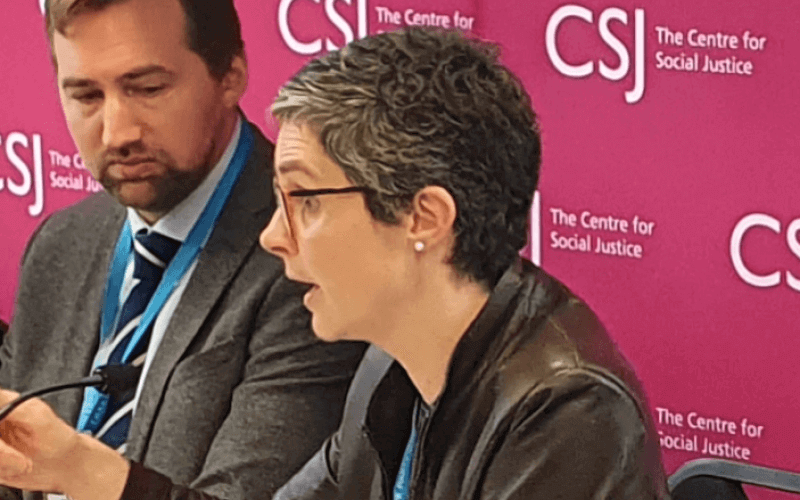The minister for disabled people has rejected most of the recommendations from a report from her department’s own advisers that called for “culture change” in the way it engages with disabled people.
The report by the Social Security Advisory Committee (SSAC) was published 18 months ago, but Chloe Smith only responded this month.
The committee had argued that the level of trust between DWP and disabled people had clearly “deteriorated over a period of successive administrations”.
And it called for “greater consistency and ground rules” in how DWP engaged with disabled people, and said that much of its engagement was with large national charities “for” disabled people, rather than user-led organisations “of” disabled people.
But Smith (pictured) has now rejected four of the report’s seven recommendations, and only partially-accepted another one, while accepting just two of the recommendations.
She rejected the idea of drawing up a co-produced protocol for how DWP should engage with disabled people because she said it was “likely to limit flexibility and increase bureaucracy”.
She also rejected the proposal to regularly publish information about DWP’s engagement with disabled people because it would not be “practical or productive”.
And she rejected the idea of recruiting a large panel of disabled people with experience of the social security system that DWP could consult with regularly, arguing that it would be “unlikely to offer value for money” and that “bespoke, targeted sample populations for each research project” are likely to be more effective.
She also rejected the idea of involving disabled people in the process of contracting out DWP’s services, such as evaluating bids.
But Smith did accept that DWP needed to do more to make its engagement more accessible to disabled people, such as making more use of tools such as video-conferencing.
And she accepted the recommendation that DWP should “rapidly assess” services in which it needs to improve accessibility and “make it a priority to implement solutions”, claiming that DWP had “already implemented a number of changes to improve the services we provide”.
She also partially accepted the recommendation that DWP should demonstrate that all people claiming social security are “central” to the way the department works.
Ken Butler, welfare rights and policy adviser for Disability Rights UK, said that DWP’s health and disability green paper had “repeatedly acknowledged the deep lack of trust disabled people have in its policies and procedures”.
He said: “The way to improve trust and ensure effective policies is to engage with and listen to disabled people constructively and consistently, both individually and via disabled people’s organisations.
“The four recommendations that the DWP has rejected would make the way it engages with disabled people much more and not less effective.”
Smith insisted that one of DWP’s “key values” was “to listen to its customers” and she said DWP “regularly seeks insight from disabled people, their representatives and organisations” through feedback on service design, surveys, events, forums and in-depth interviews.
She pointed to four stakeholder forums run by the department, including forums on assessment policy, personal independence payment policy, and Access to Work, two groups of advisers on its Disability Confident scheme, and the Regional Stakeholder Network of nine regional networks of 225 disabled people, their organisations, parents and carers across England.
She also highlighted the consultation and other engagement that has taken place both before and after the publication of DWP’s green paper.
Smith said: “I share the Committee’s view on the importance of keeping the voices of disabled people at the heart of health and disability policy development and delivery.
“However, I do not agree with several of the Committee’s recommendations because I believe that we can achieve the outcomes of sustained, meaningful engagement with disabled people in ways other than those identified in the report.”
A note from the editor:
Please consider making a voluntary financial contribution to support the work of DNS and allow it to continue producing independent, carefully-researched news stories that focus on the lives and rights of disabled people and their user-led organisations.
Please do not contribute if you cannot afford to do so, and please note that DNS is not a charity. It is run and owned by disabled journalist John Pring and has been from its launch in April 2009.
Thank you for anything you can do to support the work of DNS…

 ‘Disastrous’ cuts bill that leaves legacy of distrust and distress ‘must be dropped’
‘Disastrous’ cuts bill that leaves legacy of distrust and distress ‘must be dropped’ Silence from MP sister of Rachel Reeves over suicide linked to PIP flaws, just as government was seeking cuts
Silence from MP sister of Rachel Reeves over suicide linked to PIP flaws, just as government was seeking cuts Disabled activists warn Labour MPs who vote for cuts: ‘The gloves will be off’
Disabled activists warn Labour MPs who vote for cuts: ‘The gloves will be off’